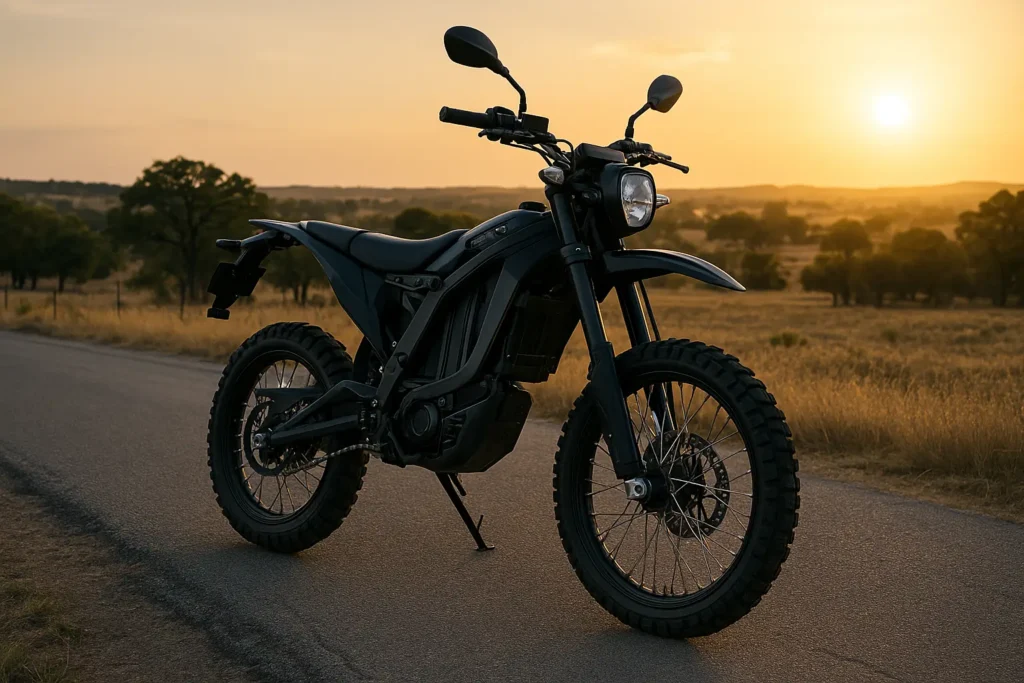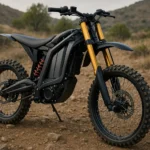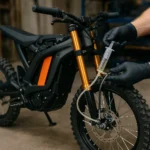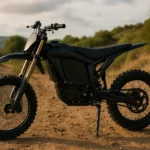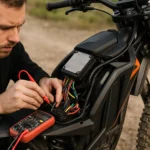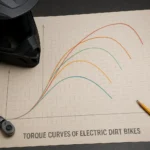Electric dirt bikes are popping up everywhere in Texas — from open trails to suburban backyards. But there’s one burning question that keeps buzzing in forums and group chats: Are electric dirt bikes street legal in Texas?
Whether you’re a weekend warrior looking to cruise around your neighborhood or someone thinking of commuting on an e-dirt bike, the laws in Texas can be a bit tricky — and confusing. That’s why we’ve crafted this guide: to give you clear, up-to-date info on what’s legal, what’s not, and what you can do about it.
We’ll break it all down in plain English so you’re not left scratching your helmet. Let’s dive in and untangle the legal spaghetti, Texas-style 🤠⚡
Key Takeaways
- Most electric dirt bikes are not street legal in Texas without specific modifications.
- Texas law typically classifies dirt e-bikes as off-road vehicles, not commuter options.
- You cannot legally ride them on public streets or sidewalks without proper registration.
- Some models like Sur-Ron can be made street legal with the right gear and paperwork.
- Always check local city laws, as rules can vary depending on where you ride.
⚡ What You’ll Learn in This Guide:
Use the quick links below to jump to the section you need most 👇
Texas Law Overview: How the State Classifies Electric Dirt Bikes
Texas doesn’t mess around when it comes to vehicle classification — and electric dirt bikes are no exception. The first step to understanding whether your e-dirt bike is street legal is knowing how the state actually defines it.
In Texas, electric dirt bikes are not the same as electric bicycles.
Let’s break it down:
- Electric bicycles are classified under three categories (Class 1, 2, and 3) and are usually allowed on streets and bike paths.
- Electric dirt bikes, on the other hand, are generally treated as off-road vehicles or motor-driven cycles, depending on their features.
Here’s the kicker:
If your electric dirt bike has no pedals and exceeds 750 watts (which most do), it’s not an e-bike under Texas law — it’s more like a motorcycle. And that changes everything.
Some examples:
- Sur-Ron Light Bee X: Technically off-road only out of the box
- Razor MX650: Treated as a toy or off-road vehicle
- Talaria Sting R MX: Falls under off-road category unless modified
⚠️ Important Note:
To be considered a street-legal vehicle, your bike must meet DOT requirements, including equipment like headlights, brake lights, reflectors, mirrors, and a VIN (Vehicle Identification Number).
So, unless it’s factory-built as street legal or modified to meet the rules, the State of Texas sees your electric dirt bike as a machine for dirt, not pavement.
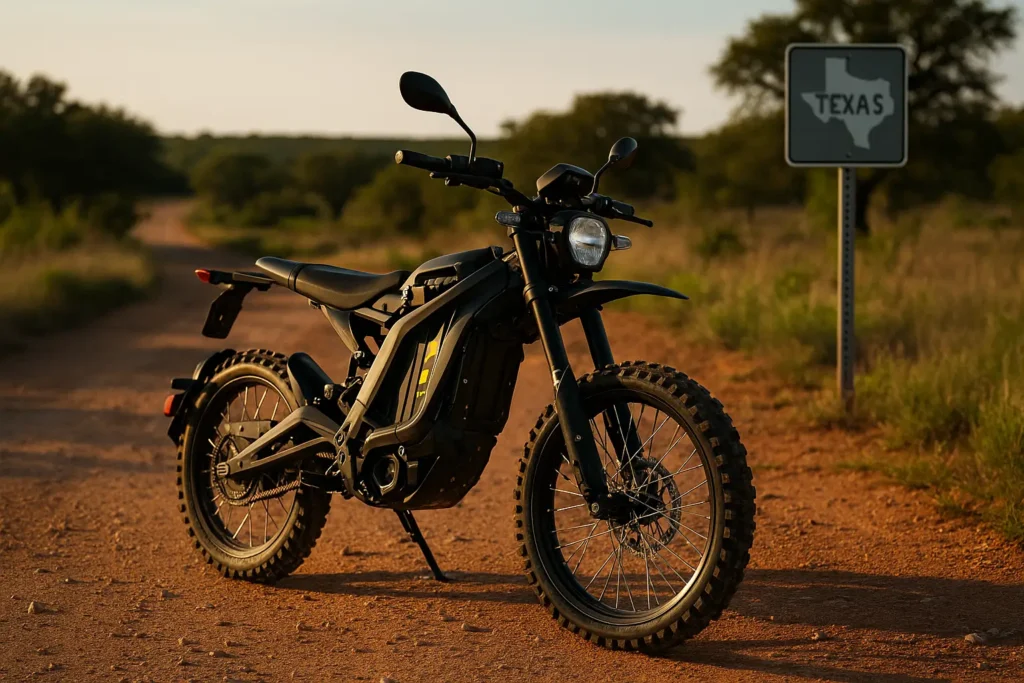
Can You Ride Electric Dirt Bikes on Public Roads in Texas?
Short answer? No — unless you’ve made it street legal.
In Texas, electric dirt bikes cannot be ridden on public roads by default. The Texas Department of Motor Vehicles (TxDMV) classifies most of these bikes as off-highway vehicles (OHVs), which means they are meant for dirt trails, private property, or designated off-road parks — not paved streets.
To legally ride on the road, your e-dirt bike must:
- Meet Department of Transportation (DOT) equipment standards
- Have a VIN (Vehicle Identification Number)
- Be registered with the TxDMV
- Be titled as a street-legal vehicle
- Pass a safety inspection
- Carry liability insurance
That’s a big checklist. Most stock electric dirt bikes like the Sur-Ron Light Bee, Talaria Sting, or Razor MX650 do not come equipped with what’s required — meaning they’re illegal to ride on roads until modified.
🚦 Even riding across a road or through your neighborhood “just for fun” can get you fined.
And yes, there have been reports of bikes being confiscated in some counties.
➡️ Some riders go the extra mile and install street-legal conversion kits: mirrors, brake lights, turn signals, horn, speedometer — but even with all that, you’ll still need to get it inspected, titled, and registered to make it truly legal in the Lone Star State.
Are Electric Dirt Bikes Allowed on Sidewalks or Parks in Texas?
Think sidewalks and parks are a loophole for riding your electric dirt bike? Think again.
In Texas, riding electric dirt bikes on sidewalks, bike lanes, or public parks is generally prohibited. That’s because these areas are usually governed by local ordinances, and most cities classify electric dirt bikes as motor vehicles, even if they’re not street-legal.
Let’s break it down by area:
Sidewalks:
Nope. Texas law prohibits any motorized vehicles — including e-dirt bikes — from being operated on sidewalks meant for pedestrians. This is true in cities like Austin, Houston, and Dallas.
Public Parks & Trails:
Most city and state parks only allow Class 1 or Class 2 e-bikes — not electric dirt bikes. These bikes are often too powerful, too fast, and too loud for shared paths.
Some exceptions exist for off-road parks (we’ll cover that later), but if you’re thinking of taking your Sur-Ron through a neighborhood greenbelt or local hiking trail, think twice. 🚫
Urban vs Rural:
In rural areas or small towns, enforcement might be more relaxed — but that doesn’t make it legal. And if an accident happens, you’re still liable.
⚠️ Tip: Always check with your local city ordinances before riding anywhere that’s not private land or a designated OHV trail. A quick phone call could save you from a ticket — or worse, a confiscated bike.
What Happens If You Ride Illegally in Texas?
So, what’s the worst that can happen if you take your electric dirt bike for a spin on a Texas road without going through the proper channels?
Spoiler: It’s not just a slap on the wrist.
Here’s what you might be facing if caught riding illegally:
Fines and Penalties
Depending on the city or county, you could be fined anywhere from $100 to over $500 for operating an unregistered motor vehicle.
Repeat offenders? The penalties stack up fast.
Bike Confiscation
Yep — law enforcement can impound your electric dirt bike if it’s being used illegally on public property. In some areas, especially cities like Austin or Dallas, they’re cracking down hard on unauthorized use.
Citations for Multiple Violations
You’re not just breaking one rule — you could be cited for:
- No registration
- No insurance
- No driver’s license (if underage)
- Unsafe vehicle
- Operating a non-roadworthy vehicle
Texas Law Reference (for the nerds like us 🤓)
Want to go straight to the source? The Texas Transportation Code – Title 7, Subtitle C outlines all rules about vehicle operation and classification:
👉 Texas Transportation Code – Title 7, Subtitle C
So yeah, cruising through town on your Sur-Ron might look cool — until you’re pulled over and walk home pushing your bike 😬
How to Make an Electric Dirt Bike Street Legal in Texas
Okay, so you want to ride your electric dirt bike on the streets of Texas — legally. Good news: it’s possible, but it takes some work (and paperwork).
Here’s a step-by-step guide to get your e-dirt bike road-ready in the Lone Star State:
Step 1: Install Street-Legal Equipment
Your bike needs to meet DOT safety standards. That means adding:
- Front and rear headlights
- Brake lights
- Turn signals (left and right)
- Rearview mirrors on both sides
- A working horn
- DOT-approved tires
- A speedometer
Without these mods, you’re not getting past inspection — period.
Step 2: Get a Vehicle Identification Number (VIN)
Some bikes (like the Sur-Ron Light Bee) don’t come with a VIN by default.
You’ll need to request one from the Texas DMV, which may involve a bike inspection or documentation from the manufacturer.
Step 3: Schedule an Inspection
Take your fully-equipped bike to a certified inspection station in Texas.
They’ll check if your vehicle complies with street safety standards.
Step 4: Register and Title Your Bike
Once you pass the inspection, head to the TxDMV office with:
- The inspection certificate
- VIN documentation
- Proof of ownership
- Proof of insurance
They’ll issue your registration, license plate, and title — just like any other motor vehicle.
Step 5: Get Insurance
You’ll need liability insurance at minimum to ride legally on public roads.
Some insurers specialize in custom or low-power vehicles — shop around.
Bonus Tip: Start with a Sur-Ron or Talaria
These are the most commonly upgraded electric dirt bikes in Texas. Many riders have already documented successful conversions, so parts and guides are widely available 🔧
Where Can You Legally Ride an Electric Dirt Bike in Texas
Just because you can’t hit the streets without a full legal setup doesn’t mean you’re out of luck. Texas is a dirt rider’s paradise — if you know where to go 🏞️
Here’s where electric dirt bikes are welcome:
Off-Road Parks (The Real Deal)
Texas has some awesome OHV (Off-Highway Vehicle) parks where electric dirt bikes are not only allowed — they’re encouraged. A few favorites:
- Hidden Falls Adventure Park (Marble Falls)
Massive off-road park with trails for all skill levels. E-dirt bikes are allowed with OHV permit. - Sam Houston National Forest – Multi-Use Trails
Offers legal trails for motorized vehicles — great for electric dirt bikes. - Barnwell Mountain Recreation Area (Gilmer)
Managed by the Texas Motorized Trails Coalition, and known for hosting electric bike riders.
Private Property
Got land? Know someone who does? Private property is fair game — as long as the owner gives permission, you’re free to rip.
Tip: Always wear gear, even on private land. Safety first.
Rural Dirt Roads (Use Caution)
Some low-traffic dirt roads in rural Texas are gray zones. While technically still public, enforcement may be relaxed.
Just remember — gray zone ≠ green light. If it’s a public road, the rules still apply.
What About Public Trails or City Parks?
Most city parks and public trail systems prohibit electric dirt bikes, unless clearly marked otherwise. Always check signage and local laws.
If in doubt? Don’t risk it — or make a call to the parks department.
Electric Dirt Bikes vs E-Bikes: What’s Legal Where?
This is where a lot of people get confused — and it’s no surprise. Electric dirt bikes and electric bicycles are not the same thing, especially under Texas law.
Let’s clear it up:
Electric Bicycles (E-Bikes)
These are usually allowed in many public places by default, and are divided into 3 classes:
- Class 1: Pedal-assist, max 20 mph
- Class 2: Throttle-powered, max 20 mph
- Class 3: Pedal-assist, max 28 mph (helmet required)
If your bike fits one of these, you can likely ride it on bike lanes, city roads, and public trails — no registration required.
Electric Dirt Bikes
These are:
- More powerful
- Heavier
- Built for off-road
- Lacking pedals (usually)
- Capable of much higher speeds
They do not fit into any of the e-bike classes, and therefore must be registered and street-legal to be ridden anywhere public.
Why It Matters
Many riders mistakenly think their Sur-Ron or Talaria is just “like a beefier e-bike” — but legally, it’s not. That misunderstanding can cost you big time in fines or legal trouble 💸
If you’re wondering how this compares to other states, check out our full breakdown here:
👉 Are Electric Dirt Bikes Street Legal? Full Guide
It goes deep into national-level rules and how Texas fits into the bigger picture.
FAQs About Electric Dirt Bikes in Texas
Do I need a license to ride an electric dirt bike in Texas?
If you plan to ride on public roads, yes — you need a valid driver’s license, just like any other motor vehicle.
For off-road riding on private land or in OHV parks, no license is required.
Can a Sur-Ron be registered in Texas?
It can — but only if properly modified to meet street-legal standards.
That includes installing all required DOT equipment, getting a VIN, passing inspection, and registering with the TxDMV. Many riders in Texas have successfully done it.
Are kids allowed to ride electric dirt bikes in public?
No. On public roads, only licensed drivers can operate street-legal vehicles.
For off-road or private property, kids can ride — but always with safety gear and adult supervision.
Can I ride my electric dirt bike in Texas neighborhoods?
Not unless it’s street legal. Riding through neighborhoods on a non-registered dirt bike is illegal — and yes, neighbors have reported it in many areas.
Stick to private property or legal riding zones to avoid trouble.
What is the fine for riding a dirt bike on the street in Texas?
Fines vary by county, but they typically range from $100 to $500 or more, depending on how many rules you’ve broken.
Your bike may also be impounded, and repeat offenses could escalate to criminal charges.
Final Thoughts: Know Before You Ride
So, are electric dirt bikes street legal in Texas?
Not by default — but they can be.
With the right equipment, registration, and paperwork, you can ride your e-dirt bike on public roads legally. Without all that? You’re limited to off-road parks, private property, or running the risk of a fine (or worse).
The most important takeaway? Know the laws in your area before twisting the throttle.
Rules can vary from city to city, and what’s okay in rural West Texas might be a no-go in downtown Austin. Always double-check with your local ordinances — and when in doubt, ride off-road, not on-road.
And if you want the bigger picture — including how other states handle this — don’t miss our full legal guide here:
👉 Are Electric Dirt Bikes Street Legal? Full Guide
Share This Guide and Join the Ride!
If this guide saved you from a nasty fine or helped you figure out how to ride legally in Texas, don’t keep it to yourself — share it with your fellow riders!
Whether you’re a seasoned off-roader or just getting started with electric dirt bikes, the more we spread the right info, the stronger our community becomes. 🤝⚡
Got a story, question, or legal twist we missed?
Drop a comment below or tag us on socials — we’d love to hear about your ride, your mods, and your dirt-fueled adventures.
Let’s keep the wheels turning and the knowledge flowing.
See you on the trails, Texas.

Tyler Brooks is the storyteller behind most of the content at Electric Dirt Zone. With over 10 years of experience in digital media and a lifelong love for off-road riding, he blends technical insight from the team with engaging, down-to-earth writing. When he’s not turning dusty trail rides into blog posts, you’ll probably find him snapping pics before things get too wild.

